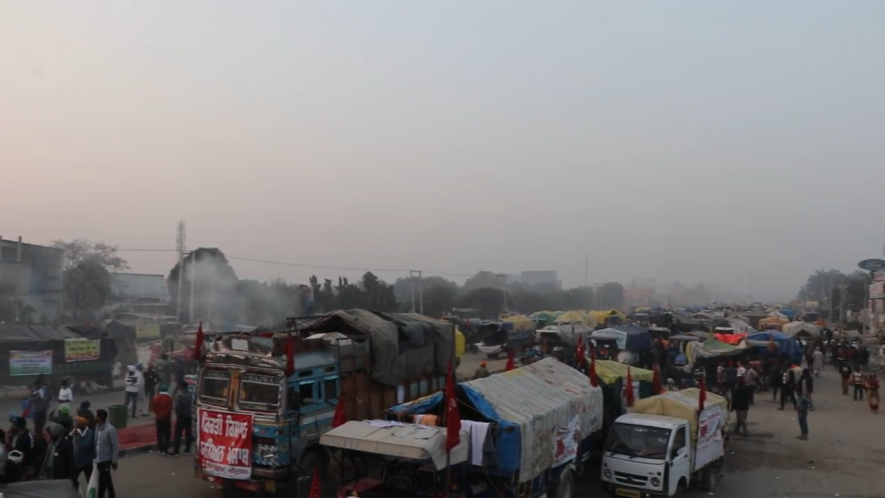Protesting Farmers ‘Are Being Misled’. Really?
A protesting farmer from Punjab at Delhi-Haryana Singhu border. Image clicked by Mohit Sauda
New Delhi: The Centre, caught with its pants down against an unprecedented assembly of farmers, which has brought entry and exit to the national capital to a grinding halt at least at two such border points, is unsurprisingly hell bent on driving home an idea to discredit the protesters: ‘Farmers are being misled’.
Apparently farmers “are being misled” by the Opposition, the agitation has been “hijacked by anti-national” forces and that the demonstrations – which are snowballing into a nationwide protest – somehow has links to “Khalistanis and Maoists”. Statements like these are being issued dime a dozen, largely by Bharatiya Janata Party (BJP) mandarins, even as the Centre enters into yet another round of negotiations with the representatives of the agitating farmers.
On the other hand, at ground-zero on the Delhi-Haryana Singhu Border, where the farmers are camping in thousands for almost a week now, the resolve of those who oppose the three Farm Laws is unshaken – not unaffected by the unfounded allegations. They are joined by farmers who are staying put at West Delhi’s Tikri Border, and those who are demonstrating at the Ghazipur border which connects Uttar Pradesh with the national capital. They have, all in once voice, demanded that a roll-back of the controversial central laws are “non-negotiable”.
Just a casual conversation with those at the protest sites will clear any apprehensions of them being ‘misled’. Instead, one could end up with a fairly comprehensive lesson on agriculture. Aside from the barricades, the stage, many langars and protest songs and tractor trolleys, there is a know-how from lived experience waiting to be shared.
But that would be possible if “only the farmers were heard,” rued Pargat Singh, who, along with his comrades, led by the Bharatiya Kisan Union’s Chaduni unit, is at the Singhu border. “The media is focusing on ways to delegitimise our protests, rather than coming here and discussing the core issues that we face today in agriculture,” Singh, in his thirties and the owner of up to ten acres of farm land in Kurukshetra district, said. “If given a chance, a farmer would explain all of better than any other expert,” he added.
Indeed, after having said so, Singh would go on to lucidly explain his apprehensions with the “kaale kanoon (black laws).” “The new laws are meant to dismantle the anaj mandis,” he said. This fear was shared by every other farmer at the protest who NewsClick spoke to.

Screenshot of a video showing rows of trucks and trolleys at Singhu border. VIdeo shot by Ronak Chhabra
The concern stems from the enactment of the Farmers’ Produce Trade and Commerce (Promotion and Facilitation) Act, 2020. The law permits anyone with a PAN card to purchase the farmers’ produce without paying fees applicable to the Agriculture Produce Market Committee (APMC). Since much of the government procurement of wheat, paddy and other crops at minimum support prices (MSP) happens in these state government-run mandis, the farmers fear that the law will push the agriculture trade out of these mandis, thereby allowing the Centre to shirk its responsibilities – in terms of remunerative support – towards the farmers. Hence, they protest.
“Right now, we know that the rate at which our produce will be sold is fixed. When it is not, then we are left to the ups and downs of the market. This is what happens with, lets say... potatoes,” Singh told NewsClick. The potato example, given the context, is interesting, as it confirms the failing ground realities of state-specific intervention to immunise farmers from adverse price stocks (for instance, ‘Bhavantar Bharpai Yojana’ of the Haryana Government).
Kevar Singh, who hails from Punjab’s Hoshiarpur district, tended to agree. “In all my 40-45 years of farming, I haven’t met a single private trader who would pay me more than the MSP,” said the 70-year-old. He suggested that even today, when the ‘minimum’ price has become the ‘maximum’, it shouldn’t be difficult to foretell what would happen in the future, if the laws continue to exist.
Given that this is the case, it shouldn’t be surprising that Punjab and Haryana are at the forefront of the current agitations. More than 90% of mandi arrivals of wheat and paddy are procured by government agencies at MSP in these two states – contrary to the situation in other states. These large farmers already have kinu, maize and other vegetable growers in their state to look to as an example of what happens when market forces decide their fate.
Slogans rent the air as part of one of farmers' rally at Singhu border. Image clicked by Mohit Sauda
However, there is a catch here. The protesting farmers are also aware of the impact that wheat and paddy has on their land, and they are not very keen on it. “The groundwater level, which was eight feet below the surface in the 80s and 90s, has now gone down to 80 ft,” lamented Harjinder Singh, a 65-year-old farmer who owns about six acres of land in Amritsar district’s Pheruman village. It is so since paddy is among the most water-guzzling crops.
The depleting levels of ground water are not the only issues here; the soil is paying the price for this pattern of agriculture which pushes for bulk production. “And in order to achieve that, we have to use more potent doses of fertilisers on our crops each passing year,” said Gurpreet Singh, a farmer from Ludhiana district.
The 42-year old, who grows paddy on 3.5 acres of farmland, explains the phenomenon with an example: consume an antibiotic regularly for long, and one will eventually find that the bacteria cells in the body have developed resistance against it. “The same is the case with soil,” Gurpreet Singh added. “Increasing doses of fertilisers also adds to our cost of production,” he lamented.
Pargat Singh said that this also affected health. “We are eating food that now contains a high level of pesticides,” he said. There shouldn’t be “any suspire” that health ailments among peopel “are on the rise,” according to him.
Anand Pal, 70, from Moga district, blames “those in the seat of power” for pushing the farmers from Punjab and Haryana to take such tough positions. “If all our problems have to go, they will date back well up to the period of the Green Revolution in the late 60s, when the Centre wanted to reduce its exports, and hence, pushed for the bulk production of wheat and paddy,” he said. It was when MSP was first announced for the wheat growers in 1966-67.
The result: the crop diversification, which had once included numerous varieties, took a hit. Crops like “jowar, makki, arhar (pulses),” used to grow in substantial quantities then, which is “hardly possible” now, he said. As far as any support from government agencies to diversify the cropping pattern is concerned, it is next to negligible.
The protesting farmers are not only demanding a rollback of the agriculture reforms, but also to make MSP an entitlement, backed by a law, for “all” crops.
“Earlier they hailed Punjab and Haryana as annadata (food provider); now they want to turn this annadata into a beggar,” wailed Pal. “We levelled our fields, set up tube wells, purchased motors – all for what, just to hand it over to the corporate houses?” he asked. The new farm laws are feared to be tilting the level playing towards the corporates, which may lead to a ‘corporatisation’ of rural India.
The Narendra Modi – led Central Government had first brought the farm reforms in a tearing hurry in the form of ordinances in June this year, without prior consultation or proper debate. On Tuesday, December 1, the Centre suggested that the protesting farmers’ unions “identify specific issues” related to the farm legislations and submit it in writing before Thursday, December 3, when the next round of talks are scheduled to happen.
This suggestion was preceded with union ministers, present in the meeting, explaining the “the benefits” of the reforms to the farmers’ delegation. The Centre also proposed to constitute an expert committee, “to put forth the issues of farmers,” - something which was however, rejected by the farmers’ outfits.
One may agree or disagree with what the farmers have been demanding, and hence, discussions are crucial. However, it must be clear by now that no “doubts” about the reforms have been created in the minds of the farmers that are leading them to protest – a point that the Centre still appears to be pushing, even during the talks with the unions.
After all, as Singh from Amritsar, said: “Modi-Shah are not farmers. What do they know about us?”
Get the latest reports & analysis with people's perspective on Protests, movements & deep analytical videos, discussions of the current affairs in your Telegram app. Subscribe to NewsClick's Telegram channel & get Real-Time updates on stories, as they get published on our website.
























